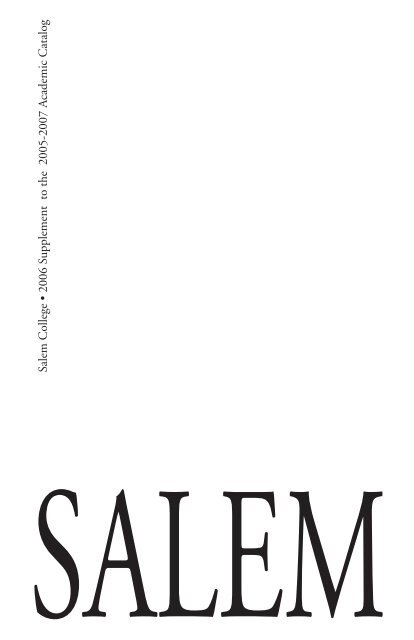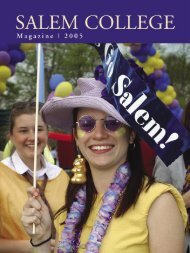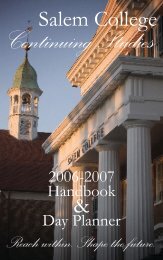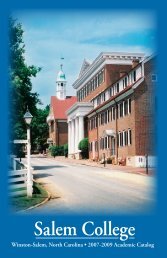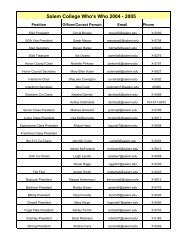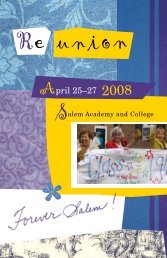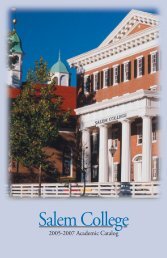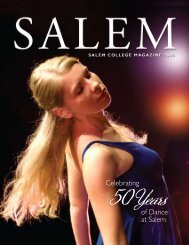Salem College ⢠2006 Supplement to the 2005-2007 A cademic ...
Salem College ⢠2006 Supplement to the 2005-2007 A cademic ...
Salem College ⢠2006 Supplement to the 2005-2007 A cademic ...
Create successful ePaper yourself
Turn your PDF publications into a flip-book with our unique Google optimized e-Paper software.
<strong>Salem</strong> <strong>College</strong> • <strong>2006</strong> <strong>Supplement</strong> <strong>to</strong> <strong>the</strong> <strong>2005</strong>-<strong>2007</strong> A<strong>cademic</strong> Catalog<br />
SALEM
To <strong>the</strong> users of <strong>the</strong> <strong>2005</strong>-<strong>2007</strong> <strong>Salem</strong> <strong>College</strong><br />
A<strong>cademic</strong> Catalog:<br />
This supplement is intended <strong>to</strong> give you <strong>the</strong> most up-<strong>to</strong>-date information<br />
regarding <strong>the</strong> a<strong>cademic</strong> programs at <strong>Salem</strong> <strong>College</strong> for <strong>the</strong> fall and spring<br />
semesters of <strong>2006</strong> and <strong>2007</strong>, respectively.<br />
Please refer <strong>to</strong> this supplement <strong>to</strong> <strong>the</strong> <strong>2005</strong>-<strong>2007</strong> A<strong>cademic</strong> Catalog for<br />
<strong>the</strong> following specific information:<br />
• <strong>2006</strong>-<strong>2007</strong> Financial Information on pages 3-5 replaces pages<br />
20-24 of <strong>the</strong> catalog.<br />
See individual department headings in this supplement for complete<br />
<strong>2006</strong> updates for each department/major including major requirements,<br />
course additions or deletions, and o<strong>the</strong>r changes.<br />
The page number listed with <strong>the</strong> new information refers <strong>to</strong> <strong>the</strong> catalog<br />
pages on which <strong>the</strong> original information appears.<br />
<strong>2006</strong> A<strong>cademic</strong> Catalog <strong>Supplement</strong> • S
FINANCIAL INFORMATION<br />
The following information is updated for <strong>the</strong> <strong>2006</strong>-<strong>2007</strong> a<strong>cademic</strong> year.<br />
Fees<br />
Resident Students<br />
Resident students are expected <strong>to</strong> enroll for a full a<strong>cademic</strong> year and pay a comprehensive<br />
fee of $27,500 which includes <strong>the</strong> enrollment deposit, tuition, room and<br />
board and labora<strong>to</strong>ry and health service fees. The <strong>College</strong> expects full-year enrollment<br />
because it reserves facilities and executes contracts <strong>to</strong> provide for <strong>the</strong> needs of<br />
<strong>the</strong> student during <strong>the</strong> entire a<strong>cademic</strong> year. Payments are scheduled as follows:<br />
Enrollment deposit—(non-refundable) $ 250.00<br />
returning students—April 1<br />
new students—May 1<br />
First term payment—August 1 $13,625.00<br />
Second term payment—January 2 $13,625.00<br />
Total $27,500.00<br />
In addition, students must pay a student government fee. The fee is $215, and subject<br />
<strong>to</strong> revision. Resident students who meet requirements for graduation at <strong>the</strong> end<br />
of <strong>the</strong> first term or new students whose enrollment begins with <strong>the</strong> second term are<br />
charged a comprehensive fee of $13,750 which also entitles <strong>the</strong> student <strong>to</strong> participate<br />
in January Term. The January Term is designed <strong>to</strong> provide unique educational<br />
experiences, and <strong>the</strong> student may incur personal costs for travel or educational supplies.<br />
Students will not qualify for participation in a January Term trip if <strong>the</strong>y have<br />
an overdue balance from a prior term, if <strong>the</strong>ir current balance is overdue, or if <strong>the</strong>y<br />
were on <strong>the</strong> monthly payment plan and <strong>the</strong>ir payments are not current.<br />
Please read <strong>the</strong> sections which contain information about installment payments and<br />
<strong>the</strong> refund policy.<br />
Non-Resident Students<br />
Non-resident students are full-time degree candidates who commute between<strong>the</strong>ir<br />
residences and <strong>the</strong> <strong>College</strong>. Non-resident students are charged a comprehensive fee<br />
of $17,949 for <strong>the</strong> a<strong>cademic</strong> year, which includes tuition, labora<strong>to</strong>ry fees and health<br />
service fees. In addition, non-resident students must pay a student government fee.<br />
The fee is $195, and subject <strong>to</strong> revision. Payments are scheduled as follows:<br />
Enrollment deposit—(non-refundable) $ 250.00<br />
returning students—April 1<br />
new students—May 1<br />
First term payment—August 1 $ 8,849.50<br />
Second term payment—January 2 $ 8,849.50<br />
Total $17,949.00<br />
<strong>2006</strong> A<strong>cademic</strong> Catalog <strong>Supplement</strong> • S
Continuing Studies Student Fees<br />
Continuing Studies students are charged $920 per course credit and $1,000 per<br />
directed study course. Additional special music performance and physical education<br />
fees are described below. Continuing Studies students should also consult publications<br />
of <strong>the</strong> continuing studies office for information about services and fees.<br />
For physical education courses, Continuing Studies students are charged according<br />
<strong>to</strong> <strong>the</strong> duration of courses as follows:<br />
6 1/2 week course $100.00<br />
13 week course $200.00<br />
Music Fees<br />
Music majors and minors receive one hour of private instruction in music each<br />
week as part of <strong>the</strong> comprehensive fee. Additional private instruction is $250 per<br />
term for a one-hour lesson each week.<br />
Music minors recieve one hour of private instruction in music as required in <strong>the</strong>ir<br />
programs as part of <strong>the</strong> comprehensive fee. Additional private instruction is charged<br />
at $250 for a one hour lesson each week.<br />
The arts management major who is concentrating in music does not pay an applied<br />
music fee for <strong>the</strong> first instrument. The student is charged one-half tuition for <strong>the</strong><br />
second instrument of study, or $250.<br />
Non-music majors and continuing studies students are charged $515 per term for<br />
private instruction in music for a one-hour lesson each week.<br />
Special Fees<br />
Enrollment only for January Term $890.00<br />
Enrollment of continuing studies students for one-half credit course $460.00<br />
Auditing a course (reduced one-half for alumnae) $425.00<br />
Returned check fee $ 35.00<br />
Graduation fee $ 50.00<br />
Single room rate (Additional <strong>to</strong> regular room $752.00<br />
and board per term-non-refundable)<br />
Charges for certain physical education courses such as horseback riding and scuba<br />
diving are assessed. Charges are included in <strong>the</strong> departmental course descriptions.<br />
Charges in addition <strong>to</strong> <strong>the</strong> comprehensive fee are also assessed for off-campus study<br />
programs described in <strong>the</strong> Off-Campus Programs section of <strong>the</strong> catalog. Charges for<br />
<strong>the</strong>se programs will be announced approximately one month before <strong>the</strong> program<br />
begins.<br />
<strong>2006</strong> A<strong>cademic</strong> Catalog <strong>Supplement</strong> • S
A fee schedule for room damages is presented <strong>to</strong> each resident student when she<br />
begins occupancy of a room in <strong>the</strong> residence halls. Fees for damages are assessed at<br />
<strong>the</strong> end of each semester.<br />
The student government fee pays for class dues, o<strong>the</strong>r student organization dues,<br />
<strong>the</strong> yearbook and o<strong>the</strong>r student publications. The Student Government Association<br />
issues instructions for payment before fall term registration.<br />
Each student is entitled <strong>to</strong> one free transcript of her college record. A fee will be<br />
charged for each additional copy. However, transcripts cannot be released for<br />
students who are indebted <strong>to</strong> <strong>the</strong> college. Copies of placement files are available<br />
through Career Developmental Services for a small fee.<br />
Parking Fees<br />
Students must register au<strong>to</strong>mobiles with <strong>the</strong> business office and obtain permanent<br />
parking decals from <strong>the</strong> Office of Public Safety. If <strong>the</strong> student withdraws, refunds<br />
are made in accordance with <strong>the</strong> tuition refund policy. Parking fees are $40.<br />
Regularly enrolled residential or day students who wish <strong>to</strong> park on campus for a<br />
continuous period of one month or less may obtain a non-refundable monthly<br />
parking permit for $5.<br />
Installment Payments<br />
<strong>Salem</strong> offers a monthly installment payment plan which begins each June. There are<br />
no finance charges, but a $75 application fee is charged. Informationabout <strong>the</strong> plan<br />
may be obtained from Tuition Management Systems by calling 1-800-356-8329,<br />
www.afford.com.<br />
Degrees and Requirements<br />
Page 60. Under English. The basic requirement will be fulfilled by <strong>the</strong> English<br />
101- 102 sequence, with <strong>the</strong> following exceptions.<br />
Replace <strong>the</strong> next paragraph with :<br />
The entering student who presents an AP score in English of four or five, or<br />
an IB score of 5, will receive one course credit in English. If she also places<br />
in<strong>to</strong> <strong>the</strong> <strong>College</strong> Honors Program, she will take English 103 Honors Literature<br />
Seminar <strong>to</strong> complete her two-course English requirement. If she is<br />
not placed in <strong>the</strong> <strong>College</strong> Honors Program, she will take a 200-level literature<br />
class <strong>to</strong> complete her two-course English requirement. The entering<br />
student who places in<strong>to</strong> <strong>the</strong> <strong>College</strong> Honors Program but does not have AP<br />
<strong>2006</strong> A<strong>cademic</strong> Catalog <strong>Supplement</strong> • S
or IB credit in English as well will take English 103 and a literature course<br />
<strong>to</strong> complete her two-course English requirement. The entering student who<br />
presents an IB score of six or seven will receive credit for English 101-102 <strong>to</strong><br />
complete her English requirement.<br />
Credit for English 101 and 102 remains tentative throughout <strong>the</strong> <strong>College</strong><br />
program. Whenever a student’s written work shows that she has not mastered<br />
<strong>the</strong> basic principles of composition, she may be required <strong>to</strong> repeat English 101.<br />
A<strong>cademic</strong> Regulations<br />
Page 69. Under Withdrawal. Changes <strong>to</strong> policy in bold.<br />
Traditional students who wish <strong>to</strong> withdraw from <strong>the</strong> college are required <strong>to</strong> have an<br />
exit interview and complete a written form provided by <strong>the</strong> dean of undergraduate<br />
studies. Continuing Studies students who wish <strong>to</strong> withdraw from <strong>the</strong> <strong>College</strong><br />
should notify <strong>the</strong> dean of Continuing Studies. If <strong>the</strong> student withdraws from <strong>the</strong><br />
<strong>College</strong> during <strong>the</strong> first nine weeks of <strong>the</strong> term, she will receive ei<strong>the</strong>r a withdrawal/<br />
passing (WP) or withdrawal/failing (WF) in each course, depending on her status<br />
in <strong>the</strong> course at <strong>the</strong> time of <strong>the</strong> withdrawal. (Nei<strong>the</strong>r <strong>the</strong> WP nor <strong>the</strong> WF grade is<br />
counted in computing <strong>the</strong> student’s grade point average.) If <strong>the</strong> student withdraws<br />
from <strong>the</strong> <strong>College</strong> for o<strong>the</strong>r than medical reasons after <strong>the</strong> first nine weeks of <strong>the</strong><br />
term, she will be assigned grades based on her status in each course at <strong>the</strong> time of<br />
withdrawal. If a student must withdraw for health or family emergency reasons at<br />
any point during <strong>the</strong> term, <strong>the</strong> dean of undergraduate studies may authorize <strong>the</strong><br />
grade of withdrawal (W) for her courses, provided that <strong>the</strong> students has submitted<br />
<strong>the</strong> appropriate documentation for this type of withdrawal. A student who<br />
leaves <strong>the</strong> <strong>College</strong> or s<strong>to</strong>ps attending courses without officially withdrawing will<br />
receive a grade of F for those courses. A student who withdraws during <strong>the</strong> term<br />
for o<strong>the</strong>r than documented health or family emergency reasons will have <strong>to</strong> apply<br />
for readmission if she wishes <strong>to</strong> re-enroll for a subsequent term. If <strong>the</strong> withdrawal<br />
was for health reasons, a doc<strong>to</strong>r’s statement may be required in order <strong>to</strong> support <strong>the</strong><br />
student’s request <strong>to</strong> be readmitted at that time. The <strong>College</strong> reserves <strong>the</strong> right <strong>to</strong> request,<br />
at any time, <strong>the</strong> withdrawal of a student who does not maintain <strong>the</strong> required<br />
standards of scholarship, whose presence tends <strong>to</strong> lower <strong>the</strong> standard of conduct of<br />
<strong>the</strong> student body, or who, in <strong>the</strong> judgment of <strong>the</strong> <strong>College</strong> physician, could not remain<br />
without danger <strong>to</strong> her own health or <strong>the</strong> health of o<strong>the</strong>rs. The <strong>College</strong> reserves<br />
<strong>the</strong> right <strong>to</strong> discipline, suspend or expel a student for conduct not in accord with<br />
<strong>the</strong> spirit of <strong>Salem</strong> <strong>College</strong>.<br />
Page 73. Under International Baccalaureate Credit. Under English. Change <strong>to</strong>:<br />
A score of 5 yields one course credit; scores of 6 or 7 yield two course credits and<br />
satisfy <strong>the</strong> freshman English requirement.<br />
<strong>2006</strong> A<strong>cademic</strong> Catalog <strong>Supplement</strong> • S
Page 80. Under A<strong>cademic</strong> Probation.<br />
The current policies regarding A<strong>cademic</strong> Probation for traditional age students will<br />
be changing effective fall <strong>2006</strong> as follows:<br />
The term grade point levels used in determining probation will be changed as follows:<br />
First term: 1.5 from 1.2<br />
Second term: 1.8 from 1.5<br />
Third term: 1.9 from 1.7<br />
Fourth and all consecutive terms: 2.0<br />
Students on probation for three consecutive semesters will exclude <strong>the</strong>mselves from<br />
<strong>the</strong> <strong>College</strong>. (this provision begins with students enrolling in fall <strong>2006</strong>.)<br />
Students on probation will adhere <strong>to</strong> <strong>the</strong> following requirements:<br />
* Student may not overload while on probation. Any student wanting <strong>to</strong> take<br />
more than 4.5 credits must apply for an exception <strong>to</strong> <strong>the</strong> Subcommittee on<br />
A<strong>cademic</strong> Appeals.<br />
* Students may not add a major or a minor beyond <strong>the</strong> <strong>College</strong>’s requirement of<br />
one major while on probation. However, students may change <strong>the</strong>ir major or<br />
minor.<br />
* Students must partner with <strong>the</strong> direc<strong>to</strong>r for a<strong>cademic</strong> support. Any student on<br />
probation must meet with <strong>the</strong> direc<strong>to</strong>r for a<strong>cademic</strong> support during <strong>the</strong> first<br />
two weeks of <strong>the</strong> term during which she is on probation <strong>to</strong> establish an action<br />
plan for <strong>the</strong> semester.<br />
Students may not hold major leadership positions on campus unless approved by<br />
<strong>the</strong> dean of undergraduate studies.<br />
Courses of Instruction<br />
Page 96. Under Arts Management<br />
Professor Borwick, Direc<strong>to</strong>r<br />
Under Performing Arts Concentration (Choose four courses). There are<br />
four additional courses:<br />
Music 103 The Musical in America One course<br />
Music 105 Women in Music One course<br />
Music 107 Introduction <strong>to</strong> Music of <strong>the</strong> World One course<br />
Music 151 Acting One course<br />
Under Recommended Electives. There is one addition:<br />
Business Administration 240 Business Statistics OR<br />
Sociology 215<br />
Social Statistics<br />
<strong>2006</strong> A<strong>cademic</strong> Catalog <strong>Supplement</strong> • S
Page 108. Under Marketing. Addition as follows:<br />
For a minor in marketing, <strong>the</strong> following six courses are required:<br />
Marketing 230: Principles of Marketing<br />
Marketing 231: Marketing Research Methods<br />
Marketing 234: International Marketing<br />
Marketing 235: Service Marketing<br />
Business Administration 201: Principles of Management<br />
One of <strong>the</strong> following:<br />
Communications 218: Marketing Communication Strategy<br />
Marketing 270: Internship in Marketing<br />
At least 3 of <strong>the</strong> six courses must be taken at <strong>Salem</strong>. Marketing 270 must be taken<br />
under <strong>the</strong> supervision of a full-time <strong>Salem</strong> faculty member who is currently teaching<br />
marketing courses. This minor is not available <strong>to</strong> those students who are taking<br />
a marketing specialization in <strong>the</strong> Business Administration major.<br />
Also on Page 108: Under Marketing, second sentence should now read: although<br />
<strong>the</strong>re is no major in marketing, marketing may be chosen as ei<strong>the</strong>r a minor or a<br />
specialization area within <strong>the</strong> business administration major.<br />
Page 114. Under Chemistry Courses. Add a new course as follows:<br />
220 Special Topics in Chemistry one Course<br />
A study of an area, <strong>to</strong>pic, application or issue related <strong>to</strong> chemistry that will offer<br />
<strong>the</strong> student a broader, deeper, more practical or alternative view of <strong>the</strong> field. To<br />
be offered as needed. The <strong>to</strong>pic will be announced in <strong>the</strong> semester prior <strong>to</strong> <strong>the</strong><br />
semester in which it will be offered.<br />
Page 117. Under Arts and Arts Management courses. Change <strong>the</strong> following:<br />
Arts Management 300 should be 301<br />
Under Business and Non-Profit Management Courses: Change <strong>to</strong> <strong>the</strong> following:<br />
Not-for-Profit Management 100<br />
Not-for-Profit Management 250<br />
Page 120. Under Computer Science. Change <strong>the</strong> following two course descriptions:<br />
Replace Computer Science 140 with <strong>the</strong> following description:<br />
Computer programming in an object-oriented language such as Java for algorithmic<br />
problem solving. Programming concepts such as classes, objects, inheritance,<br />
variables and data types, methods, looping, strings, arrays, basic sorting, scientific<br />
<strong>2006</strong> A<strong>cademic</strong> Catalog <strong>Supplement</strong> • S
computations, and elementary drawing will be introduced. Requires competence in<br />
high school algebra. Spring<br />
Replace Computer Science 141 with <strong>the</strong> following description:<br />
Computer programming in an object-oriented language such as Java for algorithmic<br />
problem. Programming concepts not covered in Computer Science 140, such as<br />
collections, recursions, sorting, searching, input/output and exceptions, advanced<br />
drawing, elementary data structures will be introduced. Prerequisite: Computer Science<br />
140. Offered on demand<br />
Page 121. Creative Writing. This is a new major and this text is new <strong>to</strong> <strong>the</strong> catalog.<br />
Creative Writing<br />
Writer-in-Residence Niven, Visiting Writer Brown, Direc<strong>to</strong>r of Women Writers<br />
Center Hendricks<br />
The English department offers a Creative Writing major so as <strong>to</strong> provide talented<br />
writing students an opportunity <strong>to</strong> enhance <strong>the</strong>ir powers of expression through<br />
<strong>the</strong> close reading of texts, <strong>the</strong> free exchange of ideas, and <strong>the</strong> production of original<br />
works of poetry, fiction, and creative non-fiction. Students will be challenged<br />
<strong>to</strong> improve <strong>the</strong>ir control of <strong>the</strong> English language and will be prepared for graduate<br />
study in Creative Writing and related fields, or for a career in which <strong>the</strong>ir skills<br />
will be valued. The department fosters <strong>the</strong> imaginative talent that each student<br />
brings <strong>to</strong> <strong>the</strong> classroom with <strong>the</strong> intention of enhancing <strong>the</strong> pleasure, value, and<br />
authority that students find in literature and writing.<br />
Requirements:<br />
The Creative Writing major in English requires twelve courses beyond English<br />
101, 102, and 103. Five of <strong>the</strong> twelve courses will be in literature or literary<br />
studies as follows:<br />
One course of British Literature from Category I<br />
One course of American Literature from Category II<br />
One course of literature from Category III<br />
Two literature or literary studies electives<br />
Students may begin <strong>the</strong> Creative Writing major only after completing successfully<br />
English 101, 102, or 103.<br />
English 212 (Introduction <strong>to</strong> Creative Writing) is required of all majors and is a<br />
prerequisite <strong>to</strong> all Creative Writing classes. This course must be taken at <strong>Salem</strong><br />
<strong>College</strong>.<br />
Creative Writing majors will be required <strong>to</strong> identify a genre of interest. One 200<br />
<strong>2006</strong> A<strong>cademic</strong> Catalog <strong>Supplement</strong> • S
level and one 300 level Creative Writing course beyond 212 must be taken in <strong>the</strong><br />
same genre. In addition, one 200 level Creative Writing course beyond 212 must<br />
be taken outside <strong>the</strong> chosen genre.<br />
English 395 (Senior Seminar in Creative Writing) is required of all Creative Writing<br />
majors and can be taken only in <strong>the</strong> senior year or if <strong>the</strong> student has successfully<br />
completed all except one Creative Writing and/or one literature course for<br />
<strong>the</strong> major.<br />
Required Creative Writing Courses (all Creative Writing courses will be valued at<br />
1 credit):<br />
English 212 (a prerequisite <strong>to</strong> all Creative Writing courses)<br />
English 218 (Introduc<strong>to</strong>ry Poetry Workshop) and English 321 (Intermediate<br />
Poetry Workshop), or English 217 (Fiction and Creative Non-Fiction<br />
Workshop) and English 313 (Intermediate Fiction Workshop) or<br />
319 (Intermediate Creative Non-Fiction Workshop)<br />
One 200 level course beyond 212 in a second genre<br />
English 395 (Senior Seminar in Creative Writing)<br />
2 Creative Writing Electives<br />
Five of <strong>the</strong> seven Creative Writing courses (including 212 and 395) must be taken<br />
at <strong>Salem</strong>.<br />
Creative Writing Courses (CRWR)<br />
212. Introduction <strong>to</strong> Creative Writing One course<br />
This course is required of all Creative Writing majors and is a prerequisite <strong>to</strong> all<br />
Creative Writing courses. The course is organized for <strong>the</strong> fledgling creative writer<br />
and is designed <strong>to</strong> develop creative writing skills in poetry, fiction, and creative<br />
non-fiction. Students will read contemporary poetry, fiction, and creative nonfiction<br />
in order <strong>to</strong> deepen and broaden <strong>the</strong>ir understanding of <strong>the</strong> creative process<br />
and <strong>the</strong> craft of writing. This course must be taken at <strong>Salem</strong> <strong>College</strong>. Fall and<br />
Spring.<br />
217. Introduc<strong>to</strong>ry Fiction and Creative Non-Fiction Workshop One course<br />
In this workshop course in writing fiction and creative non-fiction, emphasis is on<br />
<strong>the</strong> craft of writing prose and how that craft contributes <strong>to</strong> meaning. The original<br />
prose of <strong>the</strong> students will make up <strong>the</strong> workshops. Workshop sessions will<br />
assist students in acquiring <strong>the</strong> skills necessary <strong>to</strong> evaluate with care <strong>the</strong> writing of<br />
o<strong>the</strong>rs as well as <strong>the</strong>ir own writing. The course also includes a survey of selected<br />
writings by fiction and creative non-fiction writers. (Prerequisite CRWR 212).<br />
<strong>2006</strong> A<strong>cademic</strong> Catalog <strong>Supplement</strong> • 10S
218. Introduc<strong>to</strong>ry Poetry Workshop One course<br />
In this workshop course on writing poetry, emphasis is on <strong>the</strong> craft of poetry and<br />
how that craft contributes <strong>to</strong> meaning. The original poetry of students will make<br />
up <strong>the</strong> workshops. Workshop sessions will assist students in acquiring <strong>the</strong> skills<br />
necessary <strong>to</strong> evaluate with care <strong>the</strong> writing of o<strong>the</strong>rs as well as <strong>the</strong>ir own writing.<br />
The course also includes a survey of selected writings by traditional and contemporary<br />
poets. (Prerequisite CRWR 212).<br />
313. Intermediate Fiction Workshop One course<br />
This workshop course in fiction writing builds upon <strong>the</strong> skills developed in 217<br />
and addresses <strong>the</strong> essential strategies for writing and evaluating fiction. Students<br />
read, discuss, and analyze contemporary fiction and original fiction written for<br />
<strong>the</strong> class. Writing will focus on short s<strong>to</strong>ries and short fiction. Substantial original<br />
writing and outside reading required. (Prerequisites CRWR 212 and 217).<br />
319. Intermediate Creative Non-Fiction Workshop One course<br />
This workshop course in creative non-fiction builds upon <strong>the</strong> skills developed in<br />
217 and addresses <strong>the</strong> essential strategies for writing and evaluating creative nonfiction.<br />
Students read, discuss, and analyze writings such as essays, biographies,<br />
memoirs, as well as original creative non-fiction written for <strong>the</strong> class. Substantial<br />
original writing and outside reading required. In addition, students will discuss<br />
various modes of writing about personal experience and <strong>the</strong> aes<strong>the</strong>tic and ethical<br />
issues raised by such writing. Writing will focus on biography, essay, memoir,<br />
vignette, etc. (Prerequisites CRWR 212 and 217).<br />
321. Intermediate Poetry Workshop One course<br />
This workshop course in poetry builds upon <strong>the</strong> skills developed in 218 and addresses<br />
<strong>the</strong> essential strategies for writing and evaluating poetry. Students read,<br />
discuss, and analyze contemporary poetry and original poetry written for <strong>the</strong><br />
class. Writing will focus on various forms of poetry. Substantial original writing<br />
and outside reading required. (Prerequisites CRWR 212 and 218).<br />
370. Special Topics in Creative Writing One course<br />
This advanced workshop course will put emphasis on a sustained creative writing<br />
project. Students will focus on manuscript preparation and should anticipate individual<br />
conferences with <strong>the</strong> professor. Topic will vary each semester and could<br />
include advanced poetry, fiction, or creative non-fiction. Additional possible <strong>to</strong>pics<br />
might include novel writing, screenwriting, or writing for children. Students<br />
may take <strong>the</strong> course for credit more than once if <strong>the</strong> genre/ <strong>to</strong>pic differs, or with<br />
approval from <strong>the</strong> professor. (Prerequisites CRWR 212 and one additional Creative<br />
Writing course taken at <strong>Salem</strong>).<br />
<strong>2006</strong> A<strong>cademic</strong> Catalog <strong>Supplement</strong> • 11S
390. Editing National Literary Awards One course<br />
Students will work with <strong>the</strong> National Literary Awards given annually in fiction,<br />
poetry, and creative non-fiction through <strong>the</strong> Center for Women Writers. Students<br />
will be responsible for using edi<strong>to</strong>rial criteria <strong>to</strong> read, evaluate, and discuss<br />
entries. They will also help with promotion of <strong>the</strong> awards and assist in <strong>the</strong> announcement<br />
of winners. Each student will consult with <strong>the</strong> professor <strong>to</strong> identify<br />
a specific writing project. In workshops, original writing will be edited, polished,<br />
and evaluated, and culminate in a final portfolio. Prerequisite: CRWR 212 and<br />
two additional creative writing courses (all taken at <strong>Salem</strong>).<br />
395. Senior Seminar in Creative Writing One course<br />
This caps<strong>to</strong>ne workshop course is open only <strong>to</strong> seniors or students who have<br />
completed all but one creative writing class and one literature course required for<br />
<strong>the</strong> Creative Writing major. The course involves intensive writing in <strong>the</strong> students’<br />
genre of emphasis and will culminate in a substantial portfolio of original work:<br />
poetry, fiction, creative non-fiction, or an appropriate genre as determined by<br />
<strong>the</strong> professor. Students will complete <strong>the</strong> course with a portfolio of writing that<br />
might be used as preparation for graduate study or a career in a related field. The<br />
course will conclude with a public reading of <strong>the</strong> students’ selected works.<br />
Page 146. Under German. The entire section is being replaced with <strong>the</strong> following<br />
text:<br />
German<br />
Professor Ljungquist, chair of modern languages department; Assistant<br />
Professor Klages<br />
German is one of <strong>the</strong> three languages offered by <strong>the</strong> department of modern<br />
languages. General information relevant <strong>to</strong> <strong>the</strong> study of foreign language at<br />
<strong>Salem</strong> <strong>College</strong> can be found in <strong>the</strong> Modern Language section. Both a major<br />
and a minor in German are offered.<br />
German major<br />
All German courses offered above <strong>the</strong> 30 level may count <strong>to</strong>ward <strong>the</strong> major<br />
and unless o<strong>the</strong>rwise indicated, are conducted in German. Eight such courses<br />
are required for <strong>the</strong> major and must include German 105. At least three<br />
of <strong>the</strong> required German courses, including at least one 200-level course,<br />
must be completed at <strong>Salem</strong>. All majors will be expected <strong>to</strong> demonstrate an<br />
appropriate level of oral and written proficiency in German.<br />
To complete a major in German students may need <strong>to</strong> supplement <strong>Salem</strong>’s<br />
offerings with courses offered through an approved study-abroad program or<br />
with courses offered at Wake Forest University.<br />
<strong>2006</strong> A<strong>cademic</strong> Catalog <strong>Supplement</strong> • 12S
German minor<br />
The minor in German requires five courses above <strong>the</strong> 30 level and must<br />
include German 105. In addition, one literature course is required. At least<br />
three of <strong>the</strong> five courses must be completed at <strong>Salem</strong>.<br />
German Courses (GERM)<br />
10. German, First Level<br />
In this beginner’s class oral communication is emphasized, although listening<br />
skills, reading and writing are also taught. Culture is an integrated part of all<br />
activities. The course teaches grammar through exercises and role-play that<br />
are as close <strong>to</strong> real life situations as possible. Au<strong>the</strong>ntic German language<br />
materials are used. Active class participation required. Three class meetings a<br />
week plus a one-hour labora<strong>to</strong>ry session. FALL<br />
20. German, Second Level<br />
Continuation of German 10 at a more advanced level. After taking German<br />
10 and German 20 students will have attained a vocabulary of around 800<br />
words and will have survival skills in German-speaking countries. Active class<br />
participation required. Three class meetings a week plus a one-hour labora<strong>to</strong>ry<br />
session. Prerequisite: German 10 or proficiency equivalent. SPRING<br />
30. German Intermediate Level<br />
An in-depth review of German grammar is combined with increased reading<br />
and writing assignments. Short, modern literary texts give an introduction<br />
<strong>to</strong> different genres. Students will practice <strong>the</strong>ir language skills through class<br />
discussions, oral presentations, and essay writing. Active class participation<br />
required. Three class meetings a week plus a one-hour tu<strong>to</strong>ring session.<br />
Prerequisite: German 20 or proficiency equivalent. FALL<br />
102. German Grammar and Conversation<br />
Continuation of German 30 with increased emphasis on more advanced<br />
aspects of grammar and vocabulary. Active class participation required. Three<br />
class meetings a week plus a one-hour tu<strong>to</strong>ring session. Prerequisite: German<br />
30 or proficiency equivalent. SPRING<br />
103. Introduction <strong>to</strong> German Literature<br />
Students will get an overview of different genres of literature and will develop<br />
<strong>the</strong>ir literary interpretation skills through close readings and class discussions.<br />
Shorter texts from German-speaking countries will be introduced and<br />
special consideration will be given <strong>to</strong> <strong>the</strong>ir cultural and his<strong>to</strong>rical contexts.<br />
Prerequisite: German 102 or equivalent. Offered as needed.<br />
<strong>2006</strong> A<strong>cademic</strong> Catalog <strong>Supplement</strong> • 13S
105. Verbal Communication<br />
This course is designed <strong>to</strong> fur<strong>the</strong>r students’ fluency in spoken German with<br />
an emphasis on discussion skills, idiomatic expressions and vocabulary work.<br />
Films and short texts relating <strong>to</strong> German culture, his<strong>to</strong>ry, and literature serve<br />
as discussion <strong>to</strong>pics. Prerequisite: German 102 or proficiency equivalent.<br />
Offered as needed.<br />
200. Independent Study in German (one-quarter <strong>to</strong> one course)<br />
Independent study under <strong>the</strong> guidance of a faculty adviser. Open <strong>to</strong> students<br />
with a 2.0 cumulative average, permission of <strong>the</strong> chair of <strong>the</strong> department.<br />
Independent study may take <strong>the</strong> form of readings, research, conference,<br />
project and / or field experience. Ordinarily it may not be used <strong>to</strong><br />
substitute for a regular course in <strong>the</strong> curriculum. Independent study may be<br />
taken for a <strong>to</strong>tal of four courses, no more than two in any term. Prerequisite:<br />
Previous study in German or permission of <strong>the</strong> department.<br />
210. Business German<br />
Practice in both oral and written forms of communication, with emphasis<br />
on <strong>the</strong>ir application <strong>to</strong> practical problems encountered in social or business<br />
situations. Attention <strong>to</strong> social and economic practices which differ from<br />
those of <strong>the</strong> United States. Prerequisite: German 105 or permission of <strong>the</strong><br />
instruc<strong>to</strong>r. Offered as needed.<br />
214. Current Events<br />
This course will discuss current political and cultural events in Germanspeaking<br />
countries. Students will contribute <strong>to</strong> <strong>the</strong> <strong>to</strong>pics selection. Active<br />
participation in class discussions and oral presentations as well as written<br />
assignments in German are expected. Course may be repeated. Prerequisite<br />
German 105 or permission from <strong>the</strong> instruc<strong>to</strong>r. Offered as needed.<br />
231. German Literature in translation (offered in English)<br />
Selected masterpieces of German literature will be read and discussed in<br />
English <strong>to</strong> give non-German-reading students an opportunity <strong>to</strong> read famous<br />
works and help <strong>the</strong>m with <strong>the</strong>ir understanding of German culture. May be<br />
counted <strong>to</strong>wards German major or minor credit if assignments are written in<br />
German. Offered as needed.<br />
232. German Cinema (offered in English and German)<br />
The course will discuss German culture and his<strong>to</strong>ry as presented in German<br />
film from Expressionism <strong>to</strong> Fascist propaganda film, <strong>to</strong> post-world war II<br />
film and <strong>the</strong> New German Cinema. There will be two discussion sessions,<br />
one for non-German speaking students and one for students of German.<br />
Films are in German with English subtitles. Prerequisite for German majors<br />
and minors: German 102. Offered as needed.<br />
<strong>2006</strong> A<strong>cademic</strong> Catalog <strong>Supplement</strong> • 14S
250. Special German Topics<br />
A special period, issue or <strong>the</strong>me in German literature or culture is <strong>to</strong> be<br />
studied in depth. Topic and course content will be announced prior <strong>to</strong> registration.<br />
Course may be taught in English or German. German majors will<br />
be required <strong>to</strong> do <strong>the</strong>ir reading and writing in German whenever possible.<br />
Prerequisite for German majors: German 102 or 105. No prerequisites for<br />
o<strong>the</strong>rs. Offered as needed.<br />
260. Individual Authors (one or one-half course)<br />
The life and major works of a German author. Lectures will be in English.<br />
Readings and written work for German majors will be in German; for o<strong>the</strong>rs,<br />
in English. Course may be repeated. Prerequisite: a 100 level course or<br />
permission of <strong>the</strong> instruc<strong>to</strong>r, if <strong>the</strong> course is counted <strong>to</strong>ward a major in German.<br />
No prerequisite for those taking <strong>the</strong> course in English as an elective.<br />
Offered as needed.<br />
264. Introduction <strong>to</strong> German Poetry<br />
This course gives an overview of German language poetry and covers <strong>the</strong><br />
work of many different poets, from medieval poetry <strong>to</strong> <strong>the</strong> present. Several<br />
forms of lyric will be discussed taking in<strong>to</strong> account <strong>the</strong> his<strong>to</strong>rical context in<br />
which <strong>the</strong>y were produced. Special attention will be paid <strong>to</strong> <strong>the</strong> German<br />
Lied and its forms and <strong>to</strong> women poets of <strong>the</strong> 20 th century. Some of <strong>the</strong><br />
authors discussed are: Gryphius, Klops<strong>to</strong>ck, Goe<strong>the</strong>, Schiller, Novalis, Brentano,<br />
Mörike, Heine, S<strong>to</strong>rm, Rilke, Trakl, Brecht, Celan, Bachmann, Jandl,<br />
Bernhard, Aichinger, Kaschnitz, Wohmann, Hahn. Offered as needed.<br />
265. Women’s Au<strong>to</strong>biographies<br />
This course covers au<strong>to</strong>biographical writings of <strong>the</strong> end of <strong>the</strong> 20 th century<br />
in <strong>the</strong> his<strong>to</strong>rical context of <strong>the</strong> feminist movement, <strong>the</strong> phenomenon of<br />
“New Subjectivity” and “Vergangenheitsbewältigung” (<strong>the</strong> coming <strong>to</strong> terms<br />
with <strong>the</strong> past, namely <strong>the</strong> Holocaust). Genre typology and <strong>the</strong> concept<br />
of identity are discussed. Special emphasis is placed on <strong>the</strong> depiction of<br />
mo<strong>the</strong>r-daughter and fa<strong>the</strong>r-daughter relationships. Prerequisite: German<br />
101 or 105 or permission of <strong>the</strong> instruc<strong>to</strong>r. Offered as needed.<br />
270. Internship in German<br />
An opportunity <strong>to</strong> apply <strong>the</strong> knowledge and skills <strong>the</strong> student has learned<br />
in courses <strong>to</strong> real work settings; <strong>the</strong> apprenticeship aspect of <strong>the</strong> internship<br />
implies that <strong>the</strong> student has some base of knowledge and will increase her<br />
knowledge and skills by direct contact with an experienced, knowledgeable<br />
men<strong>to</strong>r. Open <strong>to</strong> juniors and seniors with a 2.0 cumulative average; may be<br />
taken only once for credit <strong>to</strong>ward <strong>the</strong> major or minor; admission by application<br />
only.<br />
<strong>2006</strong> A<strong>cademic</strong> Catalog <strong>Supplement</strong> • 15S
290. Honors Independent Study in German (one course)<br />
Advanced independent study under <strong>the</strong> guidance of a faculty adviser. Normally<br />
open <strong>to</strong> juniors and seniors with a 3.5 average in German. Subject <strong>to</strong><br />
<strong>the</strong> approval of <strong>the</strong> chair of <strong>the</strong> department. Honors work may be taken for<br />
a maximum of two courses).<br />
Page 153. Under Honors. There are two additional courses:<br />
210. Women at War, 1939-1945: Allied and Axis One Course<br />
An interdisciplinary seminar devoted <strong>to</strong> examining traditional gender roles<br />
in Allied and Axis societies and how <strong>the</strong>y were transformed under <strong>the</strong> impact<br />
of <strong>to</strong>tal war. This is an exercise in engendering military his<strong>to</strong>ry, from <strong>the</strong><br />
Soviet combat role for women <strong>to</strong> <strong>the</strong> more conservative American and Nazi<br />
approach <strong>to</strong> mobilizing women for war.<br />
220. Environmental Chemistry one Course<br />
An introduction <strong>to</strong> <strong>the</strong> chemistry that affects <strong>the</strong> physical environment in<br />
which we live. Topics <strong>to</strong> be addressed include: The Ozone Layer, Indoor-<br />
Outdoor Air Pollution, The Greenhouse Effect, Renewable Energy & Alternative<br />
Fuels, Toxic Organic Chemicals, Water and Water Pollution, Heavy<br />
Metals and Radioactive Pollutants. Prerequisites: Chem 202.<br />
Page 160. Under Ma<strong>the</strong>matics Minor. Change <strong>to</strong> <strong>the</strong> requirements <strong>to</strong> read:<br />
The minor in ma<strong>the</strong>matics requires <strong>the</strong> completion of five courses: Math<br />
100, Math 101, ei<strong>the</strong>r Math 102 or 103 and any o<strong>the</strong>r math courses at or<br />
above <strong>the</strong> level of Math 103. Two of <strong>the</strong> five courses must be taken at <strong>Salem</strong>.<br />
Page 162. Under Math Courses. Change title of course 221 <strong>to</strong> Abstract<br />
Algebra.<br />
Page 163. Under Modern Foreign Languages. Change head <strong>to</strong> Department<br />
of Modern Languages.<br />
Page 175. Under Not-for-Profit Management. The entire section is replaced with<br />
<strong>the</strong> following:<br />
Not-for-Profit Management<br />
Professor Borwick, Direc<strong>to</strong>r<br />
The not-for-profit management program offers a major and a minor in not-forprofit<br />
management.<br />
<strong>2006</strong> A<strong>cademic</strong> Catalog <strong>Supplement</strong> • 16S
Not-for-Profit Management Major<br />
The not-for-profit management major is an interdisciplinary one that combines<br />
study in <strong>the</strong> social sciences, accounting and/or <strong>the</strong> sciences with courses specific <strong>to</strong><br />
<strong>the</strong> field of not-for-profit management. It introduces students <strong>to</strong> “Third Sec<strong>to</strong>r”<br />
corporations and prepares <strong>the</strong>m <strong>to</strong> assume leadership roles in those organizations.<br />
The field includes advocacy, arts and culture, health care, philanthropic, private<br />
education, religious, and social service organizations. Within <strong>the</strong> major, students<br />
must complete a core of two courses in social systems and four courses in social issues.<br />
In addition, majors are required <strong>to</strong> complete seven and one-half management<br />
courses. Not-for-profit management majors must take all of <strong>the</strong>ir not-for-profit<br />
management (NFPM) courses at <strong>Salem</strong>. Opportunities are available for majors <strong>to</strong><br />
do internships in a variety of local, state, and national not-for-profit organizations.<br />
Required courses for <strong>the</strong> major:<br />
Management Courses (All seven and one-half courses are required.)<br />
Accounting 120 Financial Accounting and Analysis I One course<br />
Accounting 130 Financial Accounting and Analysis II One course<br />
Not-for-Profit Management 100 The Not-for-Profit Corporation<br />
one course<br />
Not-for-Profit Management 250 Not-for-Profit Fundraising One course<br />
Not-for-Profit Management 260 Not-for-Profit Management and Governance<br />
one Course<br />
Not-for-Profit Management 270 Not-for-Profit Management Internship<br />
one course<br />
Not-for-Profit Management 301 Organizational Planning One course<br />
Not-for-Profit Management 390 Senior Seminar<br />
one-half course<br />
Social Systems (Choose two courses)<br />
ECON201 Money, Banking, and Monetary Policy One course<br />
HIST261 The Constitution in American Life or POLI120<br />
American Government<br />
one course<br />
POLI110 Modern International Relations one course<br />
RELI120 Western Religious Traditions or 130<br />
Eastern Religious Traditions<br />
one course<br />
SOCI225 Community Social Service Systems one course<br />
O<strong>the</strong>r options may be approved upon petition <strong>to</strong> <strong>the</strong> relevant department chair<br />
and <strong>the</strong> coordina<strong>to</strong>r of <strong>the</strong> not-for-profit management program. (Both must<br />
concur.)<br />
Social Issues (Choose four courses)<br />
BIO50 Issues in Environmental Science one course<br />
BIO70 Issues in Biology for Women one course<br />
CHEM50 Modern Chemistry and Society one course<br />
<strong>2006</strong> A<strong>cademic</strong> Catalog <strong>Supplement</strong> • 17S
ECON205 Labor Economics one course<br />
HIST204 American Social and Intellectual His<strong>to</strong>ry One course<br />
HIST209 African-American His<strong>to</strong>ry one course<br />
HIST221 American Women’s His<strong>to</strong>ry one course<br />
PHIL122 Ethics or PHIL124 Business Ethics One course<br />
PSYC130 Social Psychology one course<br />
SOCI202 Race and Ethnic Relations one course<br />
SOCI220 Social Stratification one course<br />
SOCI280 Urban Community one course<br />
WMST204 Feminist Realities, Feminist Theories One course<br />
O<strong>the</strong>r options may be approved upon petition <strong>to</strong> <strong>the</strong> relevant department chair<br />
and <strong>the</strong> coordina<strong>to</strong>r of <strong>the</strong> not-for-profit management program. . (Both must<br />
concur.)<br />
Recommended Electives<br />
Business Administration 240 Business Statistics or Sociology 215<br />
Social Statistics<br />
one course<br />
Communication 120 Oral Communication<br />
one course<br />
Economics 120 Introduction <strong>to</strong> Microeconomics One course<br />
Marketing 230 Principles of Marketing one course<br />
Page 176. Under Not-for-Profit Minor. Replace description with <strong>the</strong> following:<br />
Not-for-Profit Minor The minor in not-for-profit management requires completion<br />
of <strong>the</strong> following courses: The Not-for-Profit Corporation (NFPM 100), Not-for-<br />
Profit Fundraising (NFPM 250), Organizational Planning (NFPM 301), Principles<br />
of Financial Accounting and Analysis I (ACCT 120) and Principles of Management<br />
(BUAD 201).<br />
Page 177. New course addition as follows:<br />
390. Senior Seminar One-half Course<br />
Creation of a portfolio documenting experience and/or competence in <strong>to</strong>pics and<br />
skills essential <strong>to</strong> successfull management of not-for-profit organizations. Survey of<br />
critical literature and trends in <strong>the</strong> field. Projects geared <strong>to</strong>ward <strong>the</strong> particular needs<br />
of <strong>the</strong> student. These may include preparation of position papers or consulting<br />
work for not-for-profit organizations. Spring.<br />
Page 180. Under Physical Education:<br />
Change chair <strong>to</strong> be: Athletic Direc<strong>to</strong>r, Kim Fierke, chair<br />
Second paragraph. Change <strong>the</strong> last sentence <strong>to</strong> read:<br />
<strong>2006</strong> A<strong>cademic</strong> Catalog <strong>Supplement</strong> • 18S
Participation in The <strong>Salem</strong> <strong>College</strong> Dance Company for <strong>the</strong> semester or particpation<br />
on an intercollegiate team for one season counts as one term of physical education.<br />
The Dance Minor is no longer included in <strong>the</strong> Physical Education section. For<br />
future reference, <strong>the</strong> Dance Minor will be listed under Courses of Instruction<br />
in alphabetical order after Creative Writing. The program advisor of <strong>the</strong> Dance<br />
Minor is Assistant Professor Heidi Godfrey<br />
.<br />
Under Dance Minor. Add words One Course after listings of courses PHED 036<br />
and PHED 037.<br />
Page 182-183. Add courses PHED 023 <strong>to</strong> PHED 039 <strong>to</strong> duplicated under Dance<br />
Minor. Courses are as follows:<br />
PHED 023. <strong>Salem</strong> <strong>College</strong> Dance Company<br />
This is a student dance company that focuses on Modern dance techniques while<br />
allowing <strong>the</strong> exploration of all dance forms. Performances are held at <strong>the</strong> end of<br />
each semester. Students must audition for <strong>the</strong> company. Full Term. Students must<br />
participate both fall and spring in order <strong>to</strong> complete one P.E. requirement and<br />
have it noted on <strong>the</strong>ir transcript.<br />
PHED 034. Beginning Ballet<br />
This course is an introduction <strong>to</strong> <strong>the</strong> basic Ballet vocabulary. Full Term. Offered<br />
Fall <strong>2005</strong> and alternate years.<br />
PHED 035. Intermediate/Advanced Ballet<br />
This course is fur<strong>the</strong>r development of ballet vocabulary and personal technique.<br />
Full term. Offered Spring <strong>2007</strong> and alternate years.<br />
PHED 036. Beginning Jazz<br />
An introduction <strong>to</strong> basic Jazz vocabulary through various exercises and combinations.<br />
Full Term. Offered Fall <strong>2005</strong> and alternate years.<br />
PHED 037. Intermediate/Advanced Jazz<br />
Fur<strong>the</strong>r development of Jazz vocabulary and personal technique. Full Term. Offered<br />
Spring <strong>2006</strong> and alternate years.<br />
PHED 038. Beginning Modern<br />
Introduction of basic Modern vocabulary through floor work, center exercises, and<br />
locomotion. Full Term. Offered Fall <strong>2006</strong> and alternate years.<br />
<strong>2006</strong> A<strong>cademic</strong> Catalog <strong>Supplement</strong> • 19S
PHED 039. Intermediate/Advanced Modern<br />
Fur<strong>the</strong>r development of Modern vocabulary with more complex movements and<br />
phrases. Full Term. Offered Spring <strong>2007</strong> and alternate years.<br />
Page 184. Under Physical Education/Dance Credit. Move courses listed <strong>to</strong> be<br />
with Dance Minor section that will be after Creative Writing major in Courses of<br />
Instruction listing.<br />
Page 199. Under Spanish Major. A sentence is missing. Please replace <strong>the</strong> whole<br />
paragraph with <strong>the</strong> following:<br />
All Spanish courses offered above Spanish 30 may count <strong>to</strong>ward <strong>the</strong> major and<br />
are conducted primarily in Spanish unless o<strong>the</strong>rwise indicated. Nine such<br />
courses are required for <strong>the</strong> major. These must include Spanish 105 and<br />
Spanish 206, unless exemptions are granted by <strong>the</strong> department. At least three of<br />
<strong>the</strong> required Spanish courses, including at least one 200-level course, must be<br />
completed at <strong>Salem</strong>. All majors will be expected <strong>to</strong> demonstrate an appropriate<br />
level of oral and written proficiency in Spanish. Students are strongly urged <strong>to</strong><br />
study abroad in a Spanish-speaking country. <strong>Salem</strong> offers a Jan Term at Universidad<br />
Internacional in Cuernavaca, México. This semester-credit course is a <strong>to</strong>tal<br />
immersion program in which students live with Mexican families and attend six<br />
daily hours of classes.<br />
Page 199. Under Spanish Minor. A sentence is missing. Please replace <strong>the</strong><br />
paragraph with below:<br />
The minor in Spanish requires five courses above Spanish 30. These must<br />
include Spanish 105, Spanish 206 and one civilization course. At least three of <strong>the</strong><br />
five courses must be taken at <strong>Salem</strong>.<br />
<strong>2006</strong> A<strong>cademic</strong> Catalog <strong>Supplement</strong> • 20S


